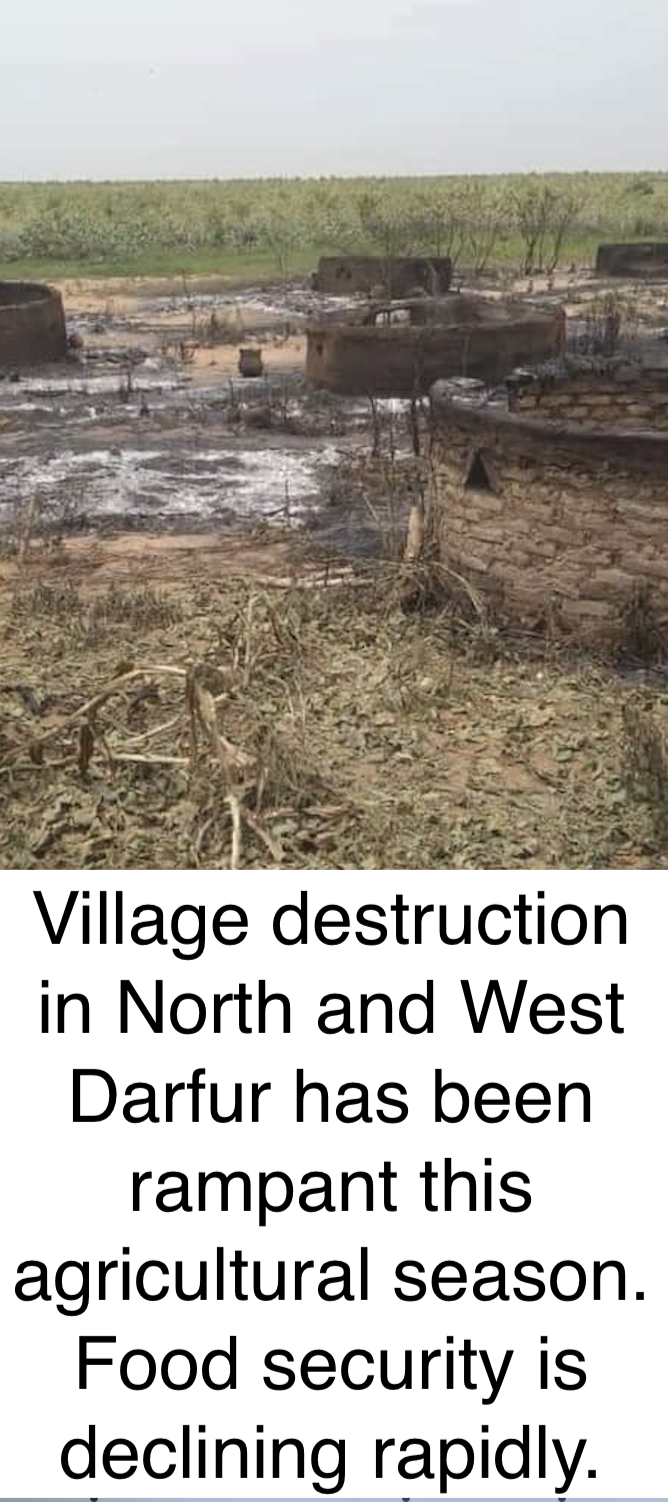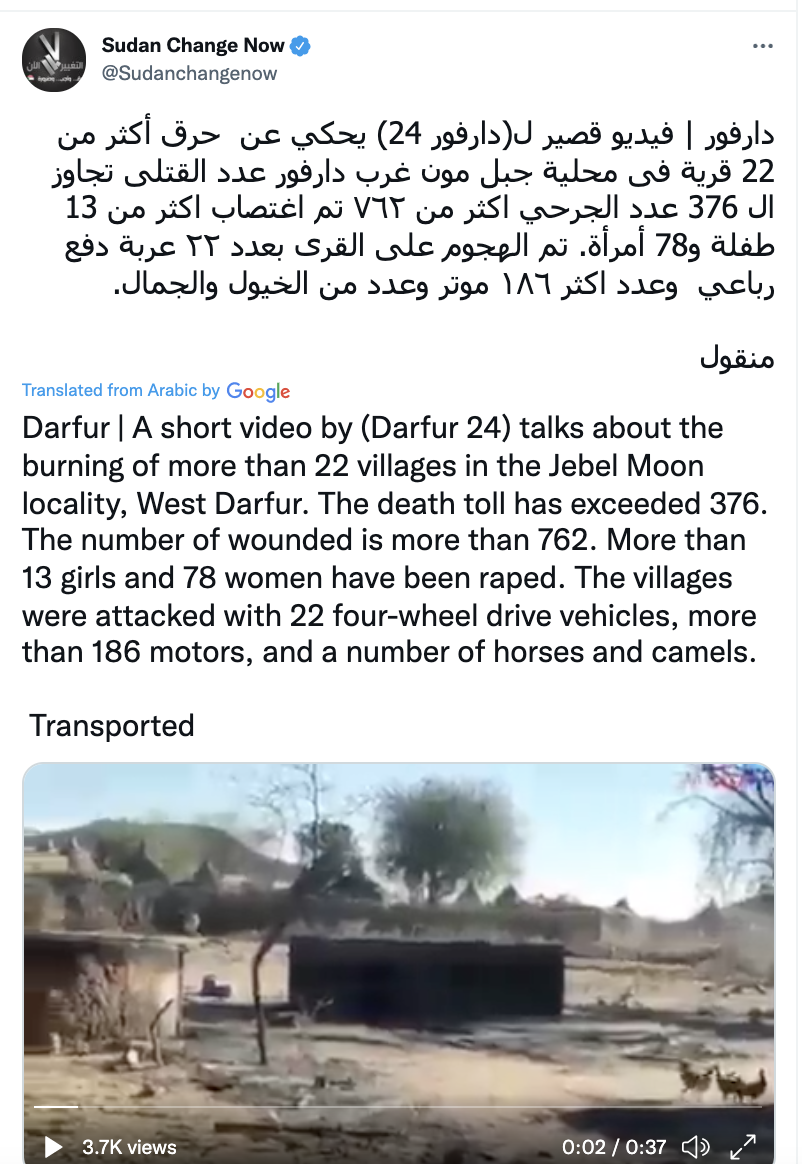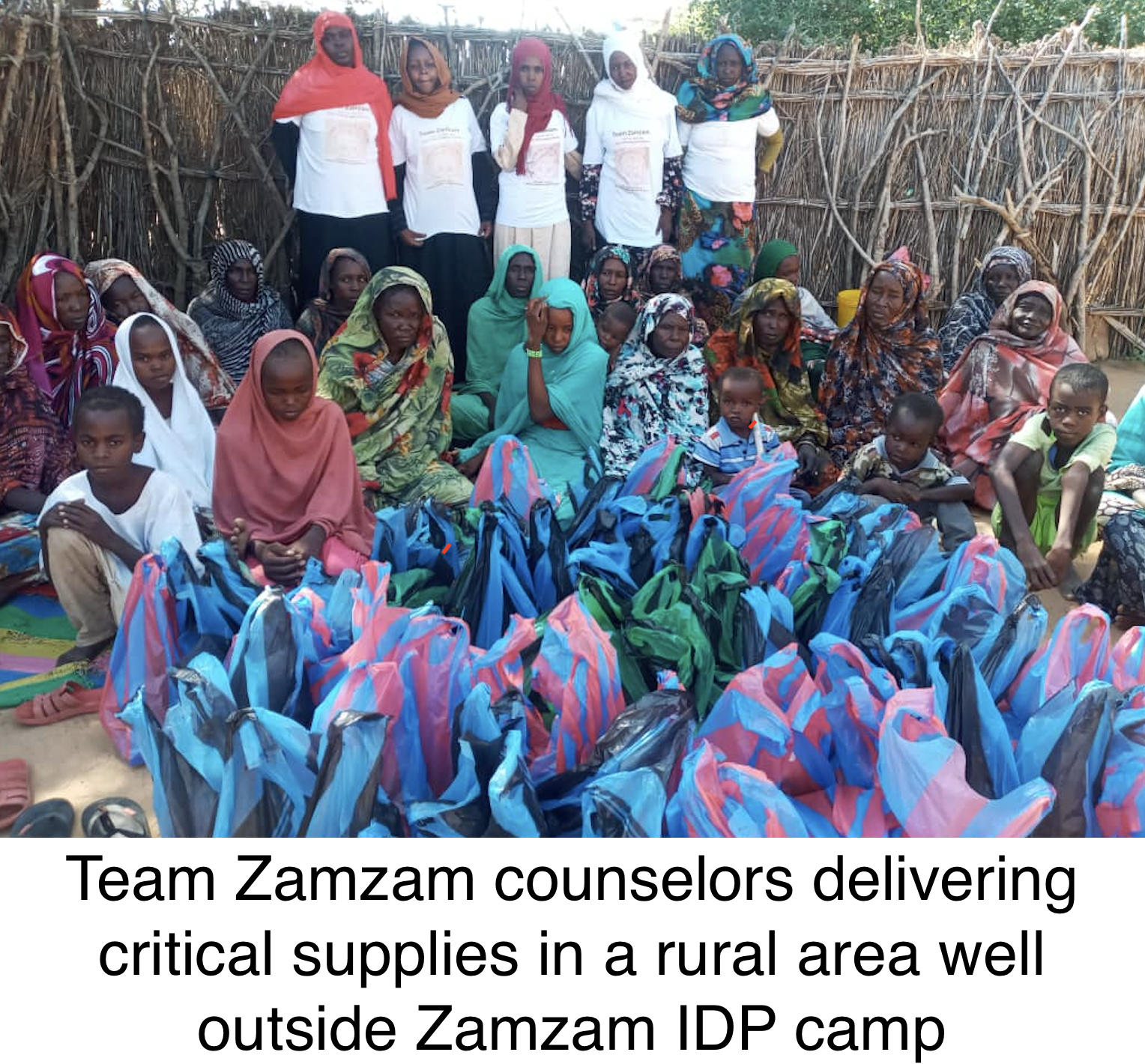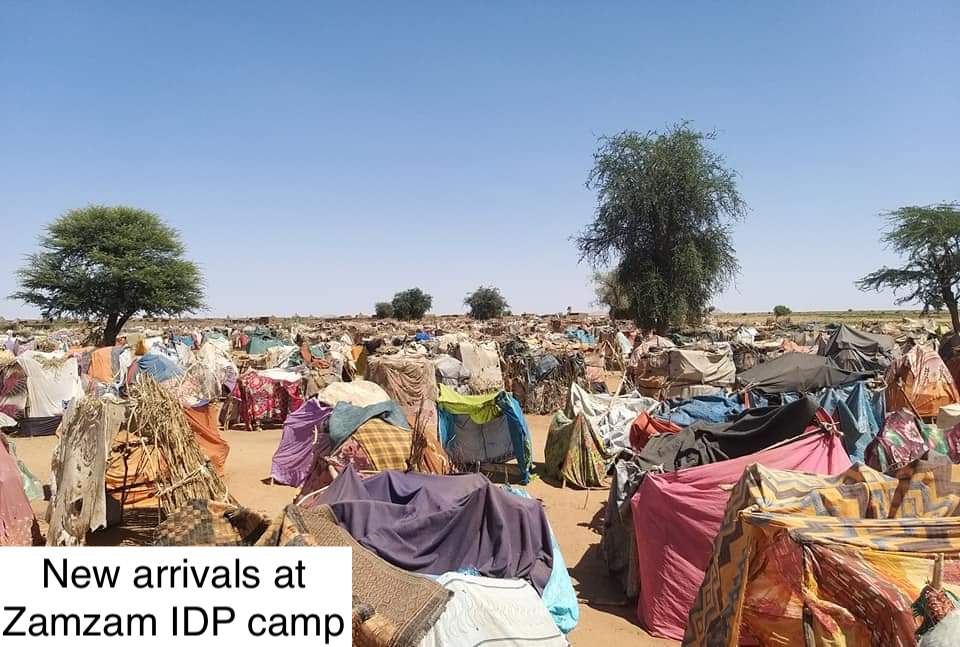Annex
Gaffar Mohammud Saeneen and Eric Reeves, Co-Chairs ; Julie Darcq, Online Campaign Coordinator; Nancy Reeves, editor and financial facilitator
From the coordinating counselor, Team Zamzam (translated by Gaffar Mohammud Saeneen):
The content of this short report is a monthly summary of the work activities that were carried out during the month of November, including the team’s various achievements, reports, and testimonies from the beneficiaries; these reflect the current deteriorating security crisis and the difficult living situation in North Darfur state. First, we thank everyone for your patience with us in preparing this belated report. The reason for the delay was due to circumstances beyond our control, such as the interruption of the communications network and the Internet, but finally we were able to complete after gradual return of Internet.
November challenges on Team Zamzam Activities
As you may know that since the last week of October, communications and Internet networks have been cut off by the state in all parts of Sudan, and this interruption has had a direct and negative impact on the level of the states and peripheral regions; this new situation had tangible effects on our routine activities in an unparalleled manner.
Although our work and our activities are direct engagement with the people on the ground, telecommunication channel were largely unavailable and follow-up on daily achievements was the cornerstone our daily routine. The temporary interruption of communication had a significant impact on the camp’s population and our daily activities; but the resilience of the counsellors and our volunteers who went door to door to inspect the well-being of the people in all the corners of 52 neighbourhoods is what has made the difference.
To conclude this opening part, I wish to note the sense of growing solidarity among the camp’s population here in Zamzam in these difficult times. This occurs despite the difficult circumstances from the interruption of communication, the latest displacement, and all the hardships of the last two violent months. We have witnessed tremendous solidarity among the inhabitants, who are doing everything to share whatever they possess with the newly displaced people who are in dire need of shelters. Lastly, on behalf of my colleagues I extend my thanks to our donors, supporters, and the growing volunteers who helped us to carry out our work.
 Deteriorating security situation southwest of El Fasher (capital of North Darfur) and new mass exodus of IDPs to the camps
Deteriorating security situation southwest of El Fasher (capital of North Darfur) and new mass exodus of IDPs to the camps
It is three months since the mass displacements of July 2021, which have forced as many as over 46,000 people to flee the inferno of Janjaweed militias and Arab nomads and leave their cultivated farms behind. The people remain in a state of panic and seek protection as IDPs.
Over half of the displaced of went back to farming in July, hoping that this time things would be slightly better and they could resume harvesting what was left of ruined farms.
But the Arab militias again struck violently, this time taking advantage of absence of communication channels to create a climate of widespread fear. These recent attacks in areas southwest of El Fasher city began in the last week of October, coinciding with the interruption of the communications network, and this situation has forced hundreds of families to flee to the camps again on an ongoing basis.
To this date no one knows the real number of those fleeing from the recent attacks of the end of October, but what we can confirm is that there are more than ten thousand people, consisting of hundreds of families—most of whom are women and children—have been displaced in the last thirty days alone in North Darfur.
The overall situation of these latest displaced in terms of needs and post-trauma effects from the attacks have not differed from the previous ones, as most of those fleeing their villages leave everything behind. Understandably, these people are complaining about night weather conditions when it becomes very cold.
During the last three weeks alone, from the beginning of November to the writing this report, we have counted more than 300 newly displaced families reaching Zamzam camp alone, arriving in several groups. Most of them arrived with their children, on foot, after walking two days to escape. We as a team, with our modest resources, were able to supply approximately 116 families with food packages.
Even with the importance of foodstuffs in mind, however, these displaced people were in dire need of clothes suitable for the weather, as well as blankets, emergency shelters, medicine (such painkillers), and other essentials. Thanks to the local solidarity and neighbourhood charities, their relatives and their extended families have helped reduce their misery. But many are still suffering and much more needs to done in the coming months.
Worsening humanitarian situation in the rurals of North Darfur and the camps
The massive disruption of the agricultural season in North Darfur state in July/August has been followed by recent attacks that ruined whatever was left of the harvest, making living conditions unbearable for the majority of the population in the rural areas, as well as in the camps, where people’s livelihoods primarily depend on the agricultural season.
The ruin of this year’s agricultural season directly contributed to a significant worsening of living conditions—and it has created a state of anxiety and fear among the people, forcing thousands of young people to leave schools in search of jobs in the main cities. While the current situation in the rural areas is getting worse, the broader situation in the camps is also significantly deteriorating in terms of health, acute shortages of food, and essential necessities because of spiking prices.
It is notable that only a third of the resident population receives a small monthly support from the UN’s World Food Program; the majority of the camp’s inhabitants depend primarily for their livelihood on the farming season and marginal jobs in the cities. But the ruin of the farming season at the beginning of July, triggered by the attacks of armed Arab militias, has been accompanied by a health crisis: the growing presence of Covid-19 has had a compounding impact on psychological state of the population.
The absence of state actors, national and international NGOs in times of crisis
Almost three years have passed since the spark of the December 2018 revolution that led to the overthrow of the former regime in Sudan. The last thing the inhabitants of these camps expected was to be totally ignored by the new hybrid government, which promised the revolutionary slogans of freedom, peace, and justice. The camps, especially the major camps such as Zamzam and Abu Shouk, contain populations equal to those of medium-sized cities in Sudan.
And yet they have been completely ignored by the state actors, which are supposed to provide at least basic necessities, such as critical health information, basic health facilities, attention to schools, provision of shelters for those who are fleeing from agricultural villages, and above all else security.
This government neglect and the absence of government resources in the camps creates an atmosphere of despair, a keen sense of disappointment, and loss of confidence in the effectiveness of the government.
As the for international and local organizations/associations, they too are completely absent from the scene with the exception of the UN World Food Program. We do not know the reasons for their absence, although in the past they were subjected to immense pressure from the al-Bashir regime to stop providing services to the camps.
The residents of these camps have been mainly supported by solidarity efforts and support of newly established local associations, most of which suffer from a lack of resources and financial support, as well as technical and qualified cadres. At the height of the health crisis and the first wave of the COVID-19 health disaster in April 2020, we found only ourselves (Team Zamzam) and two other local associations operating among a population of more than 300,000, according to statistics recognized by the official authorities.
What all the residents of these camps need for the time being is the availability of basic provisions and urgent attention from the local and international community. They must redouble their efforts to respond to the ongoing plight of suffering people so that they can resume normal lives. There is also an urgent need for the presence of major international organizations and charities to contribute to the rehabilitation of those who have suffered so much.
• Distribution of food, sanitizing soap and medicine | November 2021
Type of basic necessities: Pasta, sugar, rice, tea, cooking oil, washing soap, and flour
Number of families benefited: 138
Total number of persons benefited: 728
Total cost: $1,800.
• Other necessities:
Sanitizing soap and medicine: 220 bars of soap
Medicine (primarily painkillers): 58 large packets
Number of persons benefited from sanitary soap: 110
Number of girls benefited from medicine: 29
Total cost of sanitizing soap: $96.
Total cost of medicine (primarily pain killers): $300.
 • Women Hygiene kits Box | November 2021:
• Women Hygiene kits Box | November 2021:
Number of kit boxes: 42
Contents: 2 tubes of toothpaste, 2 tube of shaving cream, 2 razor bundles contains 24 razors inside each, 1 tube of body cream and 6 packet of menstruation cotton contains 12 pieces each
Cost per box: $9.78
Number of beneficiaries: 43
Total cost: $410.75
• Statistics on counseling sessions: November 2021
Individual counseling sessions: 126
Group counseling sessions: 38
Place of counseling: Zamzam camp
Type of counseling: therapy through talking
First time patients: 27
Repeat visits (more than once): 43
Repeated visits (more than twice): 23
Total number of counseling sessions: 164
• Reparative fistula surgeries | November 2021
Names and the ages of the fistula patients
[1] Aziza Hamid Taher, age 21 (from Zamzam IDP camp)
[2] Magboula Bahkit, age 23 (from Zamzam)
[3] Souraya Ali El-Toum, age 19 (from Zamzam)
[4] Kalida Soubor Ahmed, age 25 (from Zamzam)
[5] Nabila Mohamed Abdelkerim, age 21 (from Zamzam)
• Testimonial from fistula patient, Rouwaida M. Zakaria
“Praise be to God, today I feel very happy, because for the first time in many years I have slept for long hours without feeling pain. I always dreamed that this pain which controlled me for three years would disappear one day and now I can’t express my happiness. For a month now, I have felt that I’m regaining my confidence and getting stronger day by day.
“Because of this pain, I thought that I have lost things that can’t be replaced; but with God’s blessing I have found new friends, good listeners, and the sister counselors who encouraged me not to give up. This has helped me a lot in reconcile myself with what I experienced. My dream was and still is the same dreams of any Darfuri girl here, I want build my life, I want to get married, I want to work and be a mother, too. But most important of all I want restart fresh life.”
• “I was gang-raped defending my two daughters and I’m proud of myself,” Halima Mohamed Ibrahim
“I am a mother of two daughters and one son. I don’t know my exact age because I’ve never been to a school in my life, but I think I’m about 37 years old. I lost my husband in the war that forced us to flee to this camp 13 years ago.
“Three months ago, the Janjaweed attacked us in our farm near Qalab, and during this attack my eldest daughter and son were able to flee immediately. But I and my young daughter (who is 16 years old) we were caught and surrounded from all the directions with motorcycles, camels, and horses. After surrounding us, some of them immediately got down from the camels with ropes in their hands, and this is when I sensed the danger and told my daughter to run away, and indeed she did.
“Two Janjaweed men tried to catch her, but I intervened in the middle and told them that they must kill me first. One of them pushed me with force to the ground to go after my daughter who running away in panic, but I caught him by his leg and this was when the beating began. I fought back for few minutes but lost my consciousness in the fight. They must have hit me in head with some metal objects. Look at this part of my head on the left side. Here, these are stitches by the doctor two month ago but I still feel pain sometimes.
“They beat me up until I lost my consciousness and then they did their dirty stuff on me. I lay down there without any strength to walk until next day when I saw other locals who were fleeing towards El Fasher. They helped me to make my way to El Fasher and even I was much worried about my daughters and son but thanks god I have found all safe.
“The first two weeks of this incident, I went through hard times because the intensity of pain in head was so severe; but thank god it is now had gone. I thank sisters of Team Zamzam came to lift up my morale with their strong words and advice. Their words made me feel as if I was heroine and I must say I have done this to protect my teenage daughters.”

